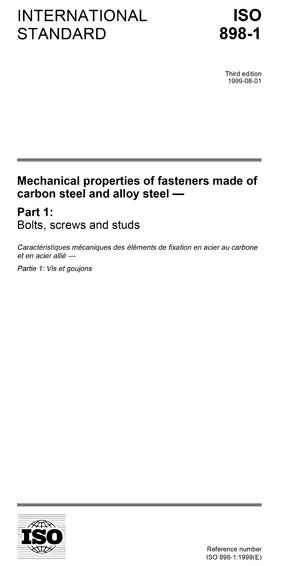Historical
ISO 898-1:1999
Mechanical properties of fasteners made of carbon steel and alloy steel - Part 1: Bolts, screws and studs
This part of ISO 898 specifies the mechanical properties of bolts, screws and studs made of carbon steel and alloy steel when tested at an ambient temperature range of 10 °C to 35 °C.
Products conforming to the requirements of this part of ISO 898 are evaluated only in the ambient temperature range and may not retain the specified mechanical and physical properties at higher and lower temperatures. Attention is drawn to annex A which provides examples of lower yield stress and stress at 0,2 % non-proportional elongation at elevated temperatures.
At temperatures lower than the ambient temperature range, a significant change in the properties, particularly impact strength, may occur. When fasteners are to be used above or below the ambient temperature range it is the responsibility of the user to ensure that the mechanical and physical properties are suitable for his particular service conditions.
Certain fasteners may not fulfill the tensile or torsional requirements of this part of ISO 898 because of the geometry of the head which reduces the shear area in the head as compared to the stress area in the thread such as countersunk, raised countersunk and cheese heads (see clause 6).
This part of ISO 898 applies to bolts, screws and studs
- with coarse pitch thread M1,6 to M39, and fine pitch thread M8 × 1 to M39 × 3;
- with triangular ISO thread in accordance with ISO 68-1;
- with diameter/pitch combinations in accordance with ISO 261 and ISO 262;
- with thread tolerance in accordance with ISO 965-1 and ISO 965-2;
- made of carbon steel or alloy steel.
It does not apply to set screws and similar threaded fasteners not under tensile stresses (see ISO 898-5).
It does not specify requirements for such properties as
- weldability;
- corrosion-resistance;
- ability to withstand temperatures above + 300 °C (+ 250 °C for 10.9) or below - 50 °C;
- resistance to shear stress;
- fatigue resistance.
International Organization for Standardization [iso]


